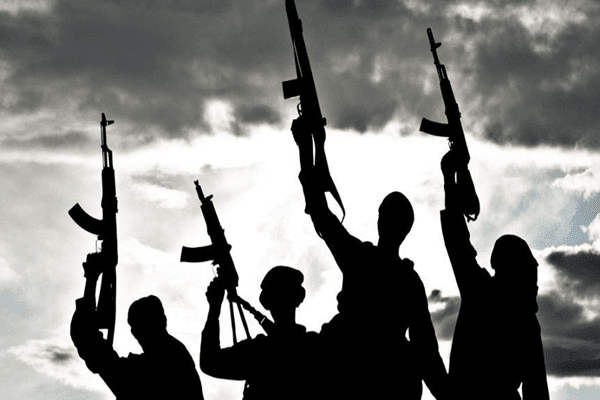March 12, 2024

The Department of State Services (DSS), the Inter-Governmental Action Group against Money Laundering in West Africa (GIABA), the National Defence College (NDC), and others have suggested ways terrorism and related crimes could be effectively tamed in the country.
The Director General of the DSS, Yusuf Bichi; the Director General of GIABA, Edwin Harris Jr.; the Commandant of the NDC, Rear Admiral Olumuyiwa Olotu and the Chief Executive Officer of the Nigerian Financial Intelligence Unit (NFIU), Mrs. Hafsat Bakari said efforts should be directed at blocking the sources of finance opened to terrorist organisations.
Bichi, Harris Jr, Olotu, and Bakari also stressed the need for enhanced inter-country collaboration in intelligence sharing and counter-terrorism initiatives.
They spoke in Abuja at the opening session of the event tagged: “Training of trainers (ToT) on countering the financing of Terrorism (CFT) for Anglophone GIABA member states,” organised by GIABA.
Bichi, who was represented by the Director of Training and Staff Development, Mrs. Bolatito Sure-Olufe, said intelligence sharing within the region will go a long way in aiding efforts at countering terrorism.
The DSS boss noted that while military and intelligence efforts have achieved notable successes in disrupting terrorist operations, it was imperative that terrorist financing networks must be disrupted.
He added that depriving terror groups of the funds that fuel their activities was crucial to undermining their capabilities and ultimately defeating them.
Bichi noted: “Terrorist organizations rely heavily on a steady flow of funds to sustain their operations, including recruitment, training, procurement of weapons and explosives, and execution of attacks.
“By targeting their financial lifelines, we can strike at the very heart of these groups, limiting their reach and hampering their ability to carry out acts of violence.
“The financial trail left by terrorist financing activities provides invaluable intelligence that can help uncover the structure, connections, and intentions of these networks, enabling more targeted and effective interventions.
“Countering the financing of terrorism is a collective responsibility that demands international cooperation and collaboration.”
Harris Jr. said money laundering and the financing of terrorism have continued to adversely impact the socio-economic development, peace, and security of ECOWAS member states and beyond.
He noted in the last decade, the ECOWAS community has experienced an increasing level of terrorism, radicalization, and violent extremisms at an alarming rate.
He added: “Counter-terrorism can no longer be the exclusive domain of the military services.
“Studies by GIABA and of the Financial Action Task Force (FATF) have rightly revealed that terrorists are increasingly using legitimate commercial enterprises to raise funds, as well as non-profit organizations, the abusive exploitation of extractive and mining resources, donations, crowdfunding, and above all, the proceeds of criminal activities such as kidnapping for ransom, extortion, illicit drug trafficking, illicit trade in small arms and light weapons, trafficking in arts and antics, etc.
“Terrorists also manage to move these collected funds through front companies, money or value couriers, using payment methods such as prepaid cards, mobile banking, or virtual assets.
“It is therefore important to optimize the technical assistance provided to the GIABA member states by making knowledge, capacities and expertise available locally, and by ensuring that resources are distributed in a more effective, efficient, and coordinated manner.
“Hence the training of trainers’ project, which has been specially designed to meet the needs of our countries,” Harris Jr said.
Represented by the Provost of the NDC, Prof. Adam Ahmed, Olotu suggested ways progress could be achieved in efforts to rid the sub-region of terrorism and related challenges.
He added: “If you fight terrorism by fighting those funding them, it will make your job easier.”
Mrs. Bakari said blocking the channels, routes, and techniques used to move these funds within ECOWAS nations and across its borders requires cooperation not just at a national level but at a regional level.
The NFIU boss noted that “one of the key pillars in our collective fight against terrorism is countering the financing that sustains these nefarious activities.
“Across the sub-region, terrorist groups have continued to threaten the lives, well-being, and commonwealth of our citizens.
“While the governments of our member states have taken decisive action to combat this threat using kinetic and non-kinetic means, it is clear that one of the most effective tools in our arsenal and the global fight against terror is identifying, pursuing, and restricting access to the funds and resources they need to carry out their activities.
“The financing which enables them to purchase and transport weapons and materials, and pay their fighters is the lifeblood of any terrorist organisation.
Blocking the channels, routes, and techniques used to move these funds within our nations and across our borders requires cooperation not just at a national level but at a regional level.
“This can only be achieved through a proper understanding and application of the role of the military, intelligence services, law enforcement agencies, prosecutors and the judiciary in this collective endeavour,” Mrs. Bakari said.
– agency report
